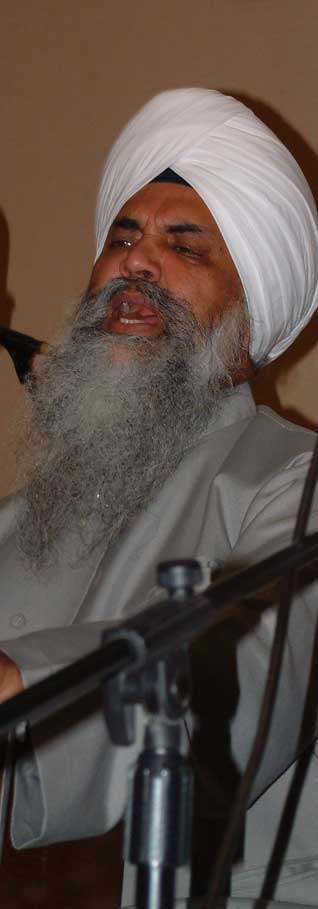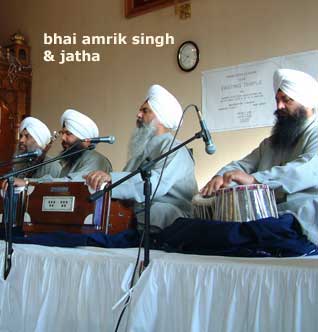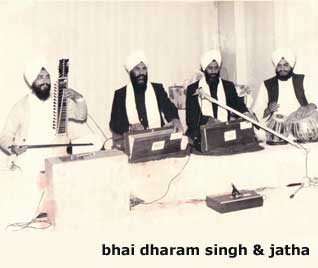Music
Bhai Amrik Singh Zakhmi:
The Raagi with the Golden Voice
SARBPREET SINGH
On November 10, 2013, the world of Gurmat Sangeet said farewell to one of its favorite sons.
Bhai Amrik Singh Zakhmi, who had been ailing for some time and had suffered a stroke, passed away, leaving an aching void in the hearts of the many lovers of Gurmat Sangeet that he had touched over a long, illustrious career.
Bhai Amrik Singh was the oldest son of Bhai Sahib Dharam Singh Zakhmi, who was unequivocally one of the greatest raagis of the 20th century. Bhai Amrik Singh is survived by his son Bhai Harjot Singh Zakhmi, a fine kirtaniya in his own right, as well as two daughters. He is also survived by four brothers, Bhai Surjit Singh Zakhmi of Milwaukee (Wisconsin, USA), the redoubtable Bhai Hariqbal Singh Zakhmi of Bombay (India), Bhai Raghbir Singh Zakhmi of Seattle (Washington, USA) and Bhai Brat Pal Singh Zakhmi of Fresno (California, USA).
Bhai Amrik Singh and Bhai Hariqbal Singh were both part of the jatha (ensemble) of Bhai Dharam Singh, which also included their uncle, Bhai Shamsher Singh Zakhmi, who was arguably one of the most brilliant raagis that ever had the good fortune to serve the panth. He was truly the voice of the jatha and if you listen to the recordings of Bhai Dharam Singh’s jatha, it is his voice that you hear mostly during the manglacharan (the introductory invocation to the first shabad) and the complex alaaps (improvisational singing of notes that enhance the composition being sung) and taans (rapid, syncopated improvisations).
Bhai Dharam Singh was the leader of the jatha and the intellectual center weight. Bhai Hariqbal Singh’s primary role was to provide tabla accompaniment, but he was also blessed with a powerful and melodious voice, which he used to great effect, particularly during the jatha’s recitation of the Asa di Vaar.
Bhai Amrik Singh’s role was subtler, yet no less critical. His were the hands that provided the elegant dilruba accompaniment that you hear in the recordings of the jatha in its glory days. He also played an important role in reciting the parmaans; parts of shabads that served as commentary or explication for the main shabad being sung, as well as singing lovely alaaps.
Bhai Dharam Singh became an amritdhari in 1947. He spent years studying gurbani and was an excellent and erudite speaker. In particular, Bhai Sahib was very familiar with the bani of the Dasam Granth as well as the ghazals of Bhai Nand Lal. Often Bhai Sahib and his jatha would sing Persian ghazals by Bhai Nand Lal accompanied by the beautiful translations of Bhai Megh Raj Garib ji.
Bhai Dharam Singh Ji would intersperse his singing with very elegant and focused commentary; his command over Punjabi and Urdu was truly impressive and his presentation very cogent. Bhai Amrik Singh clearly learned at the feet of his illustrious father. I have often heard echoes of the great Bhai Dharam Singh in Bhai Amrik Singh’s own commentary, after he formed his own jatha.
The jatha of Bhai Dharam Singh was unique in its rendition of gurbani. A key feature of their singing was the fact that their ucharan (enunciation) of bani was always crystal clear. While the jatha was very sophisticated musically and rigorously adhered to the rules of raag and taal, at no point did they ever let the raag overpower the shabad, which is the hallmark of a good exponent of gurmat sangeet.
These elements were carefully preserved in the singing of Bhai Amrik Singh and his jatha as well.
Bhai Dharam Singh belonged to the village of Manko in District Jalandhar, Punjab. The village is close to Shamchaurasi, home to the famous Pakistani Khayal singers Salamat Ali Khan and Nazakat Ali Khan. Bhai Sahib was often referred to as 'Shamchaurasi wale' or belonging to Shamchaurasi. Even though he had received the gift of music from his forefathers, Bhai Sahib studied gurmat sangeet under the guidance of Prof. Darshan Singh Komal, another giant in the world of gurmat sangeet.
After the passing of Bhai Dharam Singh ji and Bhai Shamsher Singh ji, the mantle clearly passed to Bhai Amrik Singh, who kept the family tradition alive by singing the old compositions that had been transmitted through the masters, traveling to gurdwaras and sangats (congregations) all over the world.
Unfortunately I did not get to know Bhai Amrik Singh very well. I had already moved to Boston when he visited the Bridgewater (New Jersey) gurdwara in 2003. Our conversations had always been on the phone.
I remember the first one rather vividly.
It was probably 2005. I had started the Gurmat Sangeet Project a year earlier and one of the first set of recordings that were made available on the website (www.gurmatsangeetproject.com) was an extensive archive of recordings of Bhai Dharam Singh and his jatha, made in Singapore several years ago, which were absolutely the most precious set of gurmat sangeet recordings that I had been able to find at that time.
I had enjoyed these recordings for several years, and the desire to share them with sangat members the world over was a major driving force in the creation of the Gurmat Sangeet Project.
One evening I got an unexpected phone call. The voice on the other end was warm, pleasant and very cultured. It was Bhai Amrik Singh. These were the early days, as far as hosting Gurmat Sangeet recordings on the internet was concerned. Bhai Amrik Singh had come across the archive and the small write-up about Bhai Sahib Dharam Singh and his jatha and was clearly delighted. He proceeded to thank me for the great respect shown to his father and uncle and then somewhat unexpectedly asked me to make a small correction in the write-up. My article, drawing upon various sources had mentioned the rababi roots of Bhai Dharam Singh and his family, something that Bhai Amrik Singh wanted me to ‘correct’ as, in his words, nobody in his family had ‘ever played the rabab’.
It only took me a nanosecond to understand the real nature of his objection and for a moment I reflected on the sad state of our panth today. We, the inheritors of perhaps the most egalitarian tradition on earth, which is founded on the bedrock of equality, have still not been able to shake off the cultural and social baggage of caste and origin that we have carried for time immemorial.
To me, an association with the House of Bhai Mardana is a singular honor, but then who am I to judge anyone! Particularly an erudite and accomplished kirtaniya of the Guru, who had rubbed shoulders with giants and had dedicated his whole life to serving the panth by preserving this, the most valuable of all the treasures that the Gurus have bequeathed upon us! The article was duly edited!
Over the years, I made it a point to call Bhai Sahib during my frequent trips to India. I would inquire after his health, which had been a bit fragile. We would make plans to meet; to invite him back to the US, which alas, was never to come to fruition.
In the end, I never met Bhai Amrik Singh in person. Yet I feel I know him. Well. Through his melodious voice. His polished commentary. His soulful dilruba playing. Most of all through the great treasure that he has left for posterity.
May the Zakhmis keep singing for many more generations!
November 13, 2013
Conversation about this article
1: Harman (Amritsar, Punjab), November 13, 2013, 9:11 AM.
"May the Zakhmis keep singing for many more generations!" Amen.
2: Daljit Singh (Surrey, British Columbia, Canada), November 13, 2013, 1:27 PM.
Truly one of the greatest kirtaniya families. And Bhai Shamsher Singh was simply amazing. Haven't seen anyone come close to his renditions. Sad to see the passing of the generation.
3: Harjap Singh Aujla (Monmouth Junction, New Jersey, USA), November 13, 2013, 9:05 PM.
Without meeting Bhai Amrik Singh even once, Sarbpreet Singh knows him well. This write-up is an excellent attempt to portray the kirtan traditions of the Zakhmi family. Here I must acknowledge that indeed, we the Sikhs, have maintained the scourge of the caste system. In spite of the Guru's efforts, we have not grown out of it.
4: Niku Singh (Calgary, Alberta, Canada), November 14, 2013, 8:07 AM.
As much as I respect Sarbajit Singh's efforts including his blog and other gurmat sangeet initiatives, I think Bhai Amrik Singh's writeup at this time deserved better. We all make mistakes and have innumerable weaknesses. To mention those in a memorial column is not the greatest way to honor the contributions made by this great kirtaniya. If we are so quick to point out weaknesses of an individual based on a perception, how would we treat all those individuals who have the scourge of non Singh/Kaur last names with their names? I see almost every day these individuals getting glorified on these pages with no reference to their 'surnames'. And how about all those who have chopped their hair? How do we remember them? Do we focus on their weaknesses and their shortcomings as a Sikh? We need to be more forgiving, especially to those who have contributed so much to the world of gurmat sangeet. Indeed, the panth has lost a giant and we can only highlight a little perceived weakness? And pardon me for being blunt, Mr Aujla, you are writing about the caste system while flaunting a tribal appendage to your own name? Glass house and stones. Shame on us. If most of us even did a fraction of the sewa that Bhai Amrik Singh did for the panth, our state of affairs would be a lot better.
5: Sarbpreet Singh (USA), November 14, 2013, 10:13 AM.
I usually do not respond to diatribes but I feel that it is important to clarify my intent, lest others under the potent influence of 'righteous indignation' misconstrue it as well. I was not being critical of Bhai Sahib at all; quite the contrary, I was expressing my unhappiness at the caste baggage that *we* Sikhs carry, that creates discomfort even for gems like Bhai Sahib. On a general note, the oral historian is often confronted with dilemmas such as the one this story presented. There is a natural tendency to sweep uncomfortable things under the rug because we all want to be civil and cordial. I felt that it was important to document this conversation because of its poignancy to me. It has been years, but I distinctly remember, my heart went out to this gentle soul as soon as he uttered these words and for sure I felt what he felt. Finally, I shall use my grey hair as a crutch and say this. It is never a good idea to use 'un-parliamentary' language towards other individuals in public fora. The small rush one experiences is ephemeral and is quickly replaced by feelings of regret and shame. GurFateh!
6: Rup Singh (Canada), November 14, 2013, 12:20 PM.
Indeed, the raagi with the golden voice. Bhai Amrik Singh ji was the best of his era, perhaps beyond. Always felt he sang with devotion and commitment to be a kirtaniya of Guru Sahib. Bhai Sahib will be missed no doubt, but thanks to technology his blessed voice will live forever.
7: Harminder Singh Mann (Milton, Ontario, Canada), November 19, 2013, 9:54 PM.
Bhai Dharam Singh Zakhmi and his jatha had close ties with my dad's naankay (mother's family). My dad's nana ji (maternal grandfather) brought them from Pakistan with him. Mention the name 'Bauri' to the Zakhmi family. They apparently did the anand karaj for my parents. All this means nothing in comparison to my heart being forever pierced by their kirtan.
8: Rajender Singh (Delhi, India), June 07, 2014, 5:57 AM.
Mere khyal naal Bhai Dharam Singh Zakhmi vargey kirntaniye kaddey vi iss duniya ton nahi jaane chahide. Waheguru kare ki eho jahe raagi dubara is dharti te aande rahne chahide ne ...





